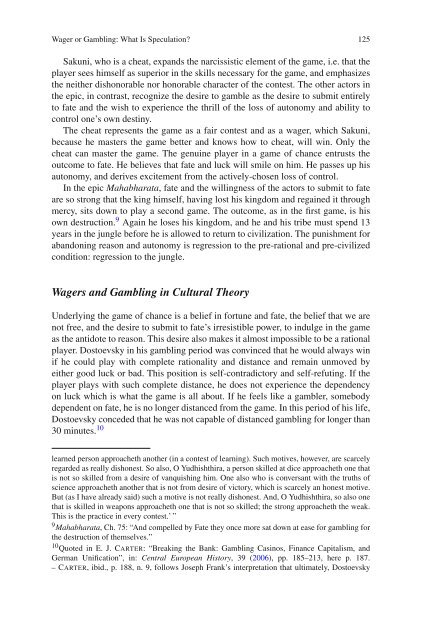The Ethics of Banking: Conclusions from the Financial Crisis (Issues ...
The Ethics of Banking: Conclusions from the Financial Crisis (Issues ...
The Ethics of Banking: Conclusions from the Financial Crisis (Issues ...
You also want an ePaper? Increase the reach of your titles
YUMPU automatically turns print PDFs into web optimized ePapers that Google loves.
Wager or Gambling: What Is Speculation? 125<br />
Sakuni, who is a cheat, expands <strong>the</strong> narcissistic element <strong>of</strong> <strong>the</strong> game, i.e. that <strong>the</strong><br />
player sees himself as superior in <strong>the</strong> skills necessary for <strong>the</strong> game, and emphasizes<br />
<strong>the</strong> nei<strong>the</strong>r dishonorable nor honorable character <strong>of</strong> <strong>the</strong> contest. <strong>The</strong> o<strong>the</strong>r actors in<br />
<strong>the</strong> epic, in contrast, recognize <strong>the</strong> desire to gamble as <strong>the</strong> desire to submit entirely<br />
to fate and <strong>the</strong> wish to experience <strong>the</strong> thrill <strong>of</strong> <strong>the</strong> loss <strong>of</strong> autonomy and ability to<br />
control one’s own destiny.<br />
<strong>The</strong> cheat represents <strong>the</strong> game as a fair contest and as a wager, which Sakuni,<br />
because he masters <strong>the</strong> game better and knows how to cheat, will win. Only <strong>the</strong><br />
cheat can master <strong>the</strong> game. <strong>The</strong> genuine player in a game <strong>of</strong> chance entrusts <strong>the</strong><br />
outcome to fate. He believes that fate and luck will smile on him. He passes up his<br />
autonomy, and derives excitement <strong>from</strong> <strong>the</strong> actively-chosen loss <strong>of</strong> control.<br />
In <strong>the</strong> epic Mahabharata, fate and <strong>the</strong> willingness <strong>of</strong> <strong>the</strong> actors to submit to fate<br />
are so strong that <strong>the</strong> king himself, having lost his kingdom and regained it through<br />
mercy, sits down to play a second game. <strong>The</strong> outcome, as in <strong>the</strong> first game, is his<br />
own destruction. 9 Again he loses his kingdom, and he and his tribe must spend 13<br />
years in <strong>the</strong> jungle before he is allowed to return to civilization. <strong>The</strong> punishment for<br />
abandoning reason and autonomy is regression to <strong>the</strong> pre-rational and pre-civilized<br />
condition: regression to <strong>the</strong> jungle.<br />
Wagers and Gambling in Cultural <strong>The</strong>ory<br />
Underlying <strong>the</strong> game <strong>of</strong> chance is a belief in fortune and fate, <strong>the</strong> belief that we are<br />
not free, and <strong>the</strong> desire to submit to fate’s irresistible power, to indulge in <strong>the</strong> game<br />
as <strong>the</strong> antidote to reason. This desire also makes it almost impossible to be a rational<br />
player. Dostoevsky in his gambling period was convinced that he would always win<br />
if he could play with complete rationality and distance and remain unmoved by<br />
ei<strong>the</strong>r good luck or bad. This position is self-contradictory and self-refuting. If <strong>the</strong><br />
player plays with such complete distance, he does not experience <strong>the</strong> dependency<br />
on luck which is what <strong>the</strong> game is all about. If he feels like a gambler, somebody<br />
dependent on fate, he is no longer distanced <strong>from</strong> <strong>the</strong> game. In this period <strong>of</strong> his life,<br />
Dostoevsky conceded that he was not capable <strong>of</strong> distanced gambling for longer than<br />
30 minutes. 10<br />
learned person approacheth ano<strong>the</strong>r (in a contest <strong>of</strong> learning). Such motives, however, are scarcely<br />
regarded as really dishonest. So also, O Yudhishthira, a person skilled at dice approacheth one that<br />
is not so skilled <strong>from</strong> a desire <strong>of</strong> vanquishing him. One also who is conversant with <strong>the</strong> truths <strong>of</strong><br />
science approacheth ano<strong>the</strong>r that is not <strong>from</strong> desire <strong>of</strong> victory, which is scarcely an honest motive.<br />
But (as I have already said) such a motive is not really dishonest. And, O Yudhishthira, so also one<br />
that is skilled in weapons approacheth one that is not so skilled; <strong>the</strong> strong approacheth <strong>the</strong> weak.<br />
This is <strong>the</strong> practice in every contest.’ ”<br />
9 Mahabharata, Ch. 75: “And compelled by Fate <strong>the</strong>y once more sat down at ease for gambling for<br />
<strong>the</strong> destruction <strong>of</strong> <strong>the</strong>mselves.”<br />
10 Quoted in E. J. CARTER: “Breaking <strong>the</strong> Bank: Gambling Casinos, Finance Capitalism, and<br />
German Unification”, in: Central European History, 39 (2006), pp. 185–213, here p. 187.<br />
–CARTER, ibid., p. 188, n. 9, follows Joseph Frank’s interpretation that ultimately, Dostoevsky

















